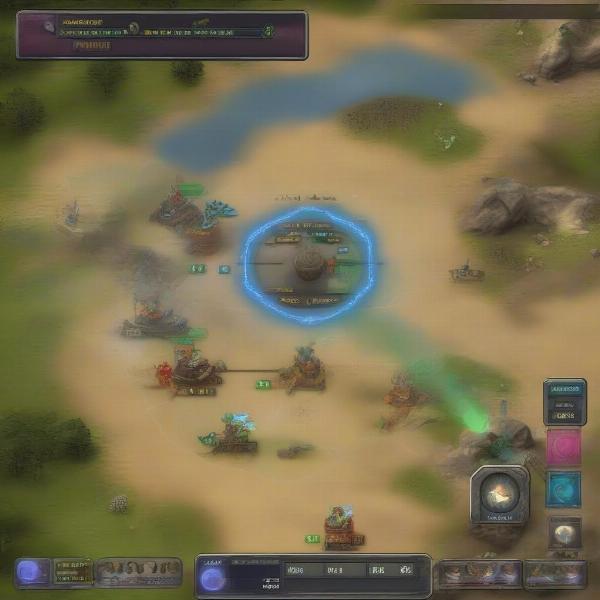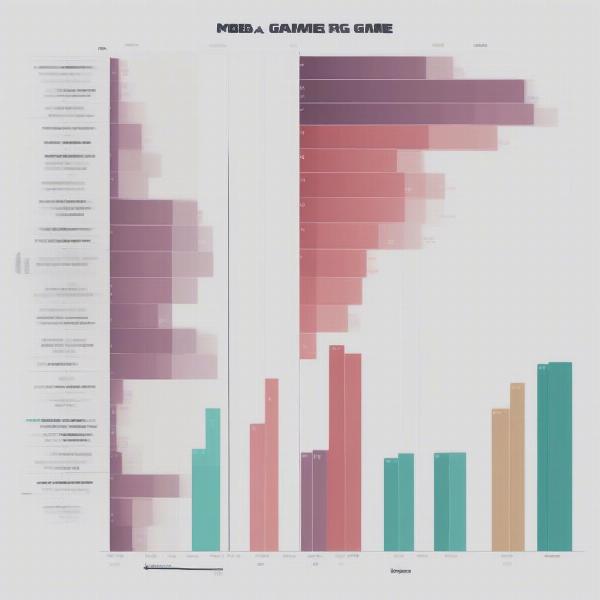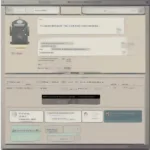Knowing how many minutes are left in the game is crucial for strategic planning, resource allocation, and simply knowing when you can finally take that bathroom break. Whether you’re a competitive esports athlete or a casual gamer, understanding time remaining can significantly impact your gameplay. This guide will explore various methods to determine remaining game time across different platforms and genres, offering valuable tips and insights for managing your precious gaming minutes.
Determining Time Remaining in Different Game Genres
Different game genres have unique ways of displaying or implying the remaining game time. Let’s explore some common scenarios:
Real-Time Strategy (RTS)
RTS games often feature a visible timer, usually displayed at the top of the screen. This timer can represent the time elapsed or the time remaining until a specific objective must be completed. Some RTS games also provide estimated completion times based on current progress.
Multiplayer Online Battle Arena (MOBA)
MOBAs like League of Legends or Dota 2 generally display the game’s elapsed time. Experienced players develop a sense of the average game length and can estimate the remaining time based on in-game events and objectives.
First-Person Shooters (FPS)
Many FPS games, especially in competitive modes, feature a round timer or a match timer. This timer is clearly displayed and dictates the remaining time for the current round or the entire match.
Role-Playing Games (RPGs)
RPGs typically don’t have a defined game timer in the same way as competitive genres. However, some RPGs offer in-game clocks that track the passage of time within the game world, affecting certain events or quests. Estimating the “remaining time” in an RPG is more about gauging progress towards completing the main storyline or specific quests.
 RTS Game Time Display
RTS Game Time Display
Sports Games
Sports games usually have a defined match length based on real-world counterparts. The remaining time is clearly displayed, often mimicking the presentation of a real-world broadcast.
Open-World Games
Open-world games rarely feature a defined “end” and therefore lack a traditional game timer. The player’s experience is driven by exploration and completing quests, and time becomes a less critical factor.
Utilizing In-Game Features and External Resources
There are several ways to determine the time remaining, depending on the game and platform.
- Check the in-game UI: Many games display the time remaining directly on the screen, often in a corner or near other important information.
- Consult the game’s menu or pause screen: The pause menu sometimes provides more detailed information about the current game state, including the time elapsed or remaining.
- Use external timers or apps: For games without built-in timers, players can use external timers or apps to track their playtime.
- Refer to community resources: Online forums, wikis, and game communities often have discussions about typical game lengths, which can provide a rough estimate of remaining time.
 External Timer App for Gaming
External Timer App for Gaming
Time Management Strategies for Gamers
Effectively managing your gaming time can significantly enhance your enjoyment and performance. Here are some strategies to consider:
- Set time limits: Determine how much time you want to dedicate to gaming and stick to it. This prevents overplaying and helps maintain a healthy balance.
- Prioritize objectives: In games with multiple objectives, focus on the most important ones first to maximize your progress within the allotted time.
- Use breaks strategically: Take short breaks to avoid fatigue and maintain focus. Plan your breaks around natural pauses in the game, such as loading screens or between rounds.
- Communicate with teammates: In multiplayer games, communication is essential for coordinating strategies and maximizing efficiency. Discuss time constraints with your team to ensure everyone is on the same page.
How Long Does a Typical Game Last?
The length of a game can vary drastically depending on the genre and specific title. Here are some general estimates:
- MOBA: 30-45 minutes
- FPS: 15-30 minutes per match
- Sports Games: Variable, depending on the sport and game settings.
- RPG: Dozens, even hundreds of hours.
 Average Game Length Chart
Average Game Length Chart
Tips for Managing Time in Competitive Games
Competitive gaming demands precise time management. Here are some additional tips for competitive players:
- Analyze replays: Reviewing your gameplay can help identify areas where you can improve your efficiency and time management.
- Practice time management drills: Specific drills can help you improve your decision-making speed and optimize your actions under time pressure.
- Develop a strong game sense: A deep understanding of game mechanics and strategies allows you to anticipate events and make quick decisions.
Conclusion
Understanding how many minutes are left in the game is a valuable skill for any gamer. By utilizing in-game features, external resources, and effective time management strategies, you can enhance your gameplay, improve your performance, and maximize your enjoyment. Whether you’re a casual player or a competitive esports athlete, mastering time management is essential for success in the gaming world. So, keep an eye on the clock, strategize effectively, and make the most of every precious minute. Share your own time management tips in the comments below!
FAQ
- How can I find the remaining time in a game if it’s not displayed? Check the game menu, consult online resources, or use an external timer.
- What are some effective time management strategies for gamers? Set time limits, prioritize objectives, take strategic breaks, and communicate with teammates.
- How long does a typical MOBA game last? MOBA games typically last between 30-45 minutes.
- Why is time management important in competitive gaming? Efficient time management allows for better decision-making and optimized gameplay under pressure.
- Are there any apps that can help me track my gaming time? Yes, there are numerous timer apps and gaming-specific time management tools available.
- How can I improve my time management skills in competitive games? Analyze replays, practice drills, and develop a strong game sense.
- How does knowing the remaining time affect my gameplay? It allows for better resource allocation, strategic planning, and overall improved performance.

